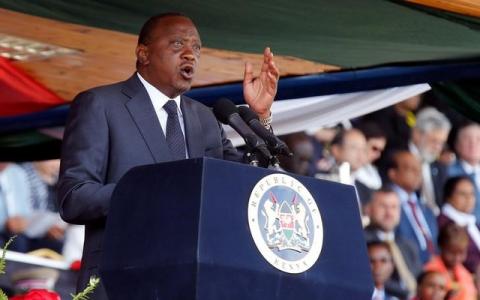Advertisement
Kenya president indicates Nairobi may reconsider its ICC membership
NAIROBI (Reuters) - Kenya's President Uhuru Kenyatta said on Monday the country will have to think seriously about its membership in the International Criminal Court (ICC), signalling another African country may quit the embattled court.
Kenyatta and his deputy William Ruto have both faced charges at the ICC over their alleged roles in the deadly inter-ethnic violence after Kenya's 2007 elections in which about 1,200 people died. Both cases collapsed due to insufficient evidence.
His announcement put new pressure on the world's first permanent war crimes court, which has had to fight off allegations of pursuing a neo-colonial agenda in Africa.
South Africa, Burundi and Gambia have officially notified the United Nations of their intent to pull out of the Rome Statute, the 1998 treaty establishing The Hague-based court. Those withdrawals will take effect in 2017.
In a televised speech to mark the establishment of Kenya as a republic in 1964, Kenyatta said the ICC had become a "tool of global power politics" and not an institution to dispense international justice.
"We have sought the changes that will align the ICC to respect national sovereignty. Those changes have not been forthcoming. We will therefore need to give serious thought to our membership," he said.
Kenya's parliament has already passed two resolutions since 2010 calling for the country to withdrawal from the court.
Kenyatta, who is standing for re-election in elections scheduled for August next year, cautioned against foreign interference, citing unnamed foreign actors whom he said were already bringing money into the country to influence the vote.
"There's already money coming into Kenya from abroad ... its true intention is to influence our electoral choices," he said.
Investors are keen to see whether Kenya, East Africa's dominant economy, can avoid violence in the next election.
Political tensions rose early this year over a disagreement on replacing electoral officials who the opposition said were incompetent and biased against them.
After multiple violent protests, the government eventually agreed to remove all senior officials of the poll body.
Namibia's President Hage Geingob told Reuters in London this month that his feeling was that Namibia would go ahead with a plan to exit the ICC as it was mainly targeting African leaders.
Opened in July 2002, the ICC, which has 124 member states, is the first legal body with permanent international jurisdiction to prosecute genocide, crimes against humanity and war crimes.
(Writing by Elias Biryabarema; Editing by James Macharia and Tom Heneghan)



















Add new comment